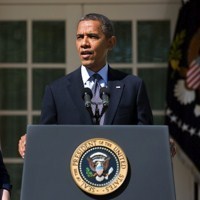President Barack Obama’s statement this morning on Egypt aimed to send a message of moral condemnation to Egypt’s military government, which only yesterday conducted a bloody crackdown against its political opponents. Yet the president’s moral messaging was compromised by the linguistic dance that accompanied it. Beyond the cancellation of annual military exercises, the only significant policy outcome was Obama’s continued resistance to the use of the word “coup” to describe the overthrow of a democratically elected government—for good or ill—by the Egyptian military.
Obama’s maneuvering harkens back to the Rwandan genocide, when the Clinton administration famously refused to use the word “genocide” unqualified, instead deploying the tortured formulation of “acts of genocide” in an effort to avoid the legal ramifications that come with the determination. The irony has not been lost that the key players in that Clinton-era drama—Susan Rice, the adviser who argued against the use of the loaded term, and Samantha Power, the journalist who shamed the Clinton administration for the dodge—are now at the top of the Obama administration’s foreign policy hierarchy.
Speaking this morning, Obama rightly acknowledged that American policy in Egypt must be “guided by our national interest.” Moral messaging is an appropriate medium, then, for making the delicate balance between interests and values. But by referring in bland tones to an “interim government” and “recent events” to describe frontal assaults on democracy and human rights, Obama undermined his own efforts to send a signal, leaving U.S. policy in Egypt with meager counterbalance to Washington’s passive support for an increasingly dangerous government.

